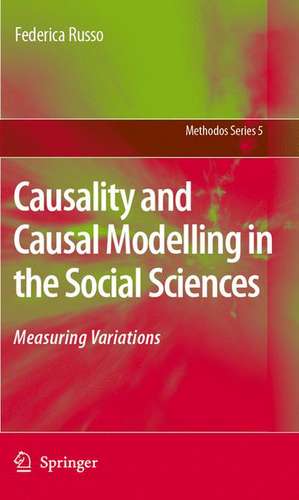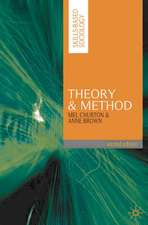Causality and Causal Modelling in the Social Sciences: Measuring Variations: Methodos Series, cartea 5
Autor Federica Russoen Limba Engleză Hardback – 24 oct 2008
This investigation into causal modelling presents the rationale of causality, i.e. the notion that guides causal reasoning in causal modelling. It is argued that causal models are regimented by a rationale of variation, nor of regularity neither invariance, thus breaking down the dominant Human paradigm. The notion of variation is shown to be embedded in the scheme of reasoning behind various causal models: e.g. Rubin’s model, contingency tables, and multilevel analysis. It is also shown to be latent – yet fundamental – in many philosophical accounts. Moreover, it has significant consequences for methodological issues: the warranty of the causal interpretation of causal models, the levels of causation, the characterisation of mechanisms, and the interpretation of probability.
This book offers a novel philosophical and methodological approach to causal reasoning in causal modelling and provides the reader with the tools to be up to date about various issues causality rises in social science.
"Dr. Federica Russo's book is a very valuable addition to a small number of relevant publications on causality and causal modelling in the social sciences viewed from a philosophical approach". (Prof. Guillaume Wunsch, Institute of Demography, University of Louvain, Belgium)
| Toate formatele și edițiile | Preț | Express |
|---|---|---|
| Paperback (1) | 888.01 lei 6-8 săpt. | |
| SPRINGER NETHERLANDS – 18 noi 2010 | 888.01 lei 6-8 săpt. | |
| Hardback (1) | 894.03 lei 6-8 săpt. | |
| SPRINGER NETHERLANDS – 24 oct 2008 | 894.03 lei 6-8 săpt. |
Din seria Methodos Series
-
 Preț: 281.46 lei
Preț: 281.46 lei - 18%
 Preț: 950.52 lei
Preț: 950.52 lei - 18%
 Preț: 946.72 lei
Preț: 946.72 lei - 15%
 Preț: 643.65 lei
Preț: 643.65 lei - 18%
 Preț: 1118.13 lei
Preț: 1118.13 lei -
 Preț: 426.56 lei
Preț: 426.56 lei - 20%
 Preț: 563.66 lei
Preț: 563.66 lei - 18%
 Preț: 1006.72 lei
Preț: 1006.72 lei -
 Preț: 354.54 lei
Preț: 354.54 lei -
 Preț: 350.72 lei
Preț: 350.72 lei - 18%
 Preț: 780.37 lei
Preț: 780.37 lei - 15%
 Preț: 646.62 lei
Preț: 646.62 lei - 15%
 Preț: 646.94 lei
Preț: 646.94 lei - 15%
 Preț: 645.79 lei
Preț: 645.79 lei - 15%
 Preț: 638.11 lei
Preț: 638.11 lei - 18%
 Preț: 1668.36 lei
Preț: 1668.36 lei - 15%
 Preț: 638.24 lei
Preț: 638.24 lei - 24%
 Preț: 786.73 lei
Preț: 786.73 lei -
 Preț: 98.73 lei
Preț: 98.73 lei
Preț: 894.03 lei
Preț vechi: 1090.28 lei
-18% Nou
Puncte Express: 1341
Preț estimativ în valută:
171.08€ • 182.94$ • 142.64£
171.08€ • 182.94$ • 142.64£
Carte tipărită la comandă
Livrare economică 17 aprilie-01 mai
Preluare comenzi: 021 569.72.76
Specificații
ISBN-13: 9781402088162
ISBN-10: 1402088167
Pagini: 252
Ilustrații: XIV, 236 p.
Dimensiuni: 155 x 235 x 21 mm
Greutate: 0.53 kg
Ediția:2009
Editura: SPRINGER NETHERLANDS
Colecția Springer
Seria Methodos Series
Locul publicării:Dordrecht, Netherlands
ISBN-10: 1402088167
Pagini: 252
Ilustrații: XIV, 236 p.
Dimensiuni: 155 x 235 x 21 mm
Greutate: 0.53 kg
Ediția:2009
Editura: SPRINGER NETHERLANDS
Colecția Springer
Seria Methodos Series
Locul publicării:Dordrecht, Netherlands
Public țintă
ResearchCuprins
Preface.- Introduction.- 1: Scope of the book and methodology.- 2: Structure of the book.- 3: Philosophical issue in the back of the mind.- 4: Philosophy at the service of social research.- 5: Open problems: causal realism, objectivity, and social ontology.- 1: What do social scientists do?- Introduction.- 1.1: Different causal claims?- 1.2: Smoking and lung cancer.- 1.3: Mother’s education and child survival.- 1.4: Health and wealth.- 1.5: Farmer’s migration.- 1.6: Job satisfaction.- 1.7: Methodological and epistemological morals.- 2: Probabilistic approaches.- Introduction.- 2.1: Philosophical accounts: Good and Suppes.- 2.2: probabilistic theories: traditional criticisms.- 2.3: Brining causal theory to maturity.- 3: Methodology of causal modeling.- Introduction.- 3.1: Methods and assumptions of causal modeling.- 3.1.1: Path models and causal diagrams.- 3.1.2: Covariance structure models.- 3.1.3: Granger-causality.- 3.1.4: Rubin’s model.- 3.1.5: Multilevel analysis.- 3.1.6: Contingency tables.- 3.2: Hypothetico-deductive methodology.- 3.3: Difficulties and weaknesses of causal modeling.- 4: Epistemology of causal modeling.- Introduction.- 4.1: The rationale of causality: Measuring variations.- 4.2: Varieties of variations.- 4.3: Wha guarantees the causal interpretation?- 4.3.1: Associational models.- 4.3.2: Causal models.- 5: Methodological consequences: objective Bayesianism.- Introduction.- 5.1: Probabilistic causal inferences.- 5.2: Interpretations of probability.- 5.3: The case for frequency-driven epistemic probabilities.- 6: Methodological consequences: mechanisms and levels of causation.- Introduction.- 6.1: Mechanisms.- 6.1.1" Modelling mechanisms.- 6.1.2: Mixed mechanisms.- 6.1.3 Explaining through mechanisms.- 6.1.4: Modelling causal mechanisms vs. modeling decision-making processes.- 6.2: Levels of causation.- 6.2.1: Twofold causality.- 6.3: Levels of analysis.- 6.3.1: Types of variables and of fallacies.- 6.3.2: Levels of analysis vs. levelsof causation.- 6.3.3: Levels of analysis.- 6.3.4: Levels of analysis and variation in multilevel models.- 7: Supporting the rationale of variations.- Introduction,- 7.1: Variation in mechanist approaches.- 7.2: Variation in counterfactuals.- 7.3: Variation in agency theories.- 7.4: Variation in manipulability theories.- 7.5: Variation in epistemic causality.- 7.6: Variation in single instances: concluding remarks.- 1: Objectives, methodology, and results.- 2: The methodological import of philosophical results.- References.- Index.
Recenzii
From the reviews:
"Few books in philosophy specifically deal with causality in the social sciences. Fewer still draw on real examples taken from the social science literature. Here is an exception to the rule. Though a philosopher, Dr. Russo has an extensive background in the social sciences and has collaborated with social scientists in several of her research projects.
Causality and Causal Modelling in the Social Sciences: Measuring Variations is therefore a compulsory reading both for philosophers of science and for social scientists. For philosophers on the one hand, reading this book is a good way of experiencing how social science is actually done, far from the arm-chair view of scientific practice. For social scientists on the other hand, it is a way of confronting their practice in causal research to broader concerns in the philosophy of science.
Strongly recommended also to the sceptics who believe that, because there are no general laws in the social sphere, causal explanations are impossible. They will think twice after reading this book."
(Prof. Guillaume Wunsch, Institute of Demography, University of Louvain, Belgium)
“In Causality and Causal Modelling in the Social Sciences, Federica Russo attempts a mutually enlightening exchange between the philosophical literature on causation and causal modeling approaches in social science. … The coverage of the philosophical literature on causation is good … . does a good job of providing an overview of current philosophical discussions of causation and probability, and I think it should be commended for attempting to systematically engage this philosophical literature with real social science research.” (Daniel Steel, British Journal for the Philosophy of Science, Vol. 63 (3), September, 2012)
"Few books in philosophy specifically deal with causality in the social sciences. Fewer still draw on real examples taken from the social science literature. Here is an exception to the rule. Though a philosopher, Dr. Russo has an extensive background in the social sciences and has collaborated with social scientists in several of her research projects.
Causality and Causal Modelling in the Social Sciences: Measuring Variations is therefore a compulsory reading both for philosophers of science and for social scientists. For philosophers on the one hand, reading this book is a good way of experiencing how social science is actually done, far from the arm-chair view of scientific practice. For social scientists on the other hand, it is a way of confronting their practice in causal research to broader concerns in the philosophy of science.
Strongly recommended also to the sceptics who believe that, because there are no general laws in the social sphere, causal explanations are impossible. They will think twice after reading this book."
(Prof. Guillaume Wunsch, Institute of Demography, University of Louvain, Belgium)
“In Causality and Causal Modelling in the Social Sciences, Federica Russo attempts a mutually enlightening exchange between the philosophical literature on causation and causal modeling approaches in social science. … The coverage of the philosophical literature on causation is good … . does a good job of providing an overview of current philosophical discussions of causation and probability, and I think it should be commended for attempting to systematically engage this philosophical literature with real social science research.” (Daniel Steel, British Journal for the Philosophy of Science, Vol. 63 (3), September, 2012)
Textul de pe ultima copertă
The anti-causal prophecies of last century have been disproved. Causality is neither a ‘relic of a bygone’ nor ‘another fetish of modern science’; it still occupies a large part of the current debate in philosophy and the sciences.
This investigation into causal modelling presents the rationale of causality, i.e. the notion that guides causal reasoning in causal modelling. It is argued that causal models are regimented by a rationale of variation, not of regularity nor invariance, thus breaking down the dominant Humean paradigm. The notion of variation is shown to be embedded in the scheme of reasoning behind various causal models: e.g. Rubin’s model, contingency tables, and multilevel analysis. It is also shown to be latent—yet fundamental—in many philosophical accounts. Moreover, it has significant consequences for methodological issues: the warranty of the causal interpretation of causal models, the levels of causation, the characterisation of mechanisms, and the interpretation of probability.
This book offers a novel philosophical and methodological approach to causal reasoning in causal modelling and provides the reader with the tools to be up to date about various issues causality rises in social science.
"Dr. Federica Russo's book is a very valuable addition to a small number of relevant publications on causality and causal modelling in the social sciences viewed from a philosophical approach".(Prof. Guillaume Wunsch, Institute of Demography, University of Louvain, Belgium)
This investigation into causal modelling presents the rationale of causality, i.e. the notion that guides causal reasoning in causal modelling. It is argued that causal models are regimented by a rationale of variation, not of regularity nor invariance, thus breaking down the dominant Humean paradigm. The notion of variation is shown to be embedded in the scheme of reasoning behind various causal models: e.g. Rubin’s model, contingency tables, and multilevel analysis. It is also shown to be latent—yet fundamental—in many philosophical accounts. Moreover, it has significant consequences for methodological issues: the warranty of the causal interpretation of causal models, the levels of causation, the characterisation of mechanisms, and the interpretation of probability.
This book offers a novel philosophical and methodological approach to causal reasoning in causal modelling and provides the reader with the tools to be up to date about various issues causality rises in social science.
"Dr. Federica Russo's book is a very valuable addition to a small number of relevant publications on causality and causal modelling in the social sciences viewed from a philosophical approach".(Prof. Guillaume Wunsch, Institute of Demography, University of Louvain, Belgium)
Caracteristici
The first book to focus on the notion of variation in causal reasoning Includes an accessible overview of the methodology of causal modelling Provides a thorough discussion of philosophical accounts of causality Bridges the gap between philosophy and the social sciences Presents a defence of objective Bayesianism in causal modelling
















